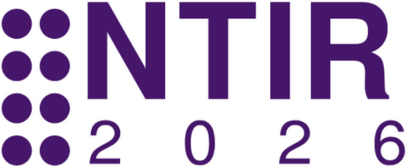New Trends in Informatics Research Conference
Location | UAlbany ETEC - View Map and Directions
Dates | April 23 to 24, 2026
Follow us on Instagram and X (Twitter)
Registration is officially open. Secure your spot now!
Location | UAlbany ETEC - View Map and Directions
Dates | April 23 to 24, 2026
Follow us on Instagram and X (Twitter)
Registration is officially open. Secure your spot now!

NTIR is an informative conference held by the College of Emergency Preparedness, Homeland Security and Cybersecurity. The event features keynote speeches, panel discussions, poster presentations and workshops that bring together researchers, practitioners and students from various fields of information studies. In this conference, you will have the opportunity to share and discuss your exciting research with fellow scholars and practitioners, learn about trending topics and inspire influential ideas that will shape the future of information science.
An abstract with 250 to 500 words (250 words is recommended). Include authors’ names, preferred pronouns, titles and affiliations to appear in the proceedings.
Proposal: An abstract and a draft poster (48-inches by 36-inches horizontal) outlining the research questions, methodology, findings and implications. The draft poster is optional but preferred.
Presentation: Illustrate research and findings of completed research, works in progress, or class projects in detail. Presenters will receive binder clips, an easel and a cardboard backing to affix the posters.
Topics: Data science & analytics, human-computer interaction, information policy & ethics, information retrieval & organization, and knowledge management, etc.
Proposal: An abstract outlining the research questions, methodology, findings and implications.
Presentation: Research and findings of completed research, works in progress, or class projects in detail with a 15-minute talk and 10-minute group discussion at the end of each session.
Topics: Combating misinformation & AI regulation / AI governance, conflict over semiconductors, quantum computing and utilization of augmented data, etc.
Proposal: An abstract describing the theme and necessary accommodations for the proposed workshop (e.g., space, materials, and time for preparation).
Presentation: 75 minutes of presenter-led hands-on activities.
Topics:
Registration fee: Free
Scholarships
Format
Items to bring
Provided items
Format
Presentation slides
Provided items
Arrival time
Dress code: Business formal or business casual attire is recommended to convey professionalism.
Audience etiquette: Please keep phones and other devices silent during talks. Practice active listening and avoid interrupting other speakers. Engage in respectful interactions, even in moments of disagreement.
Parking: Parking is available right next to the ETEC Building. Please check the “I will need a parking permit” box when registering for the conference, and a free parking permit will be provided if registered prior to March 15, 2025.
Buses
Trains
Flights
If you have any questions about the New Trends in Informatics Research Conference, please contact [email protected] or refer to the FAQs.
